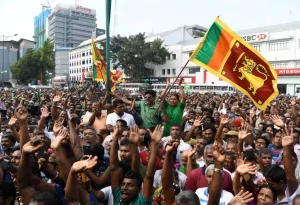
Sri Lanka’s economy is now under immense pressure to crash with the invasion of Ukraine escalating gas prices and the government struggling to recover from the economic downfall caused by COVID-19. Though the crisis is not purely because of these reasons, it is the accumulation of government mismanagement that has been going on for decades.
Nepotism is present in the Sri Lankan government as the Rajapaksa clan occupies several key roles in the government and control 24% of the nation’s money. This has of course sparked public outrage as they believe the family living in luxury is not doing what is best for the nation.
How did the crisis start?
The current prime minister of Sri Lanka, Gotabaya Rajapaksa, issued tax cuts in 2019 which had severely reduced revenues at the time the pandemic equally devastated the economy. It is well-known that Sri Lanka is dependent on foreign affairs and tourism as it makes a large part of the country’s earnings. Rajapaksa has also given substantial amounts of money to China to fund for zealous infrastructure plans, which has affected their ability to repay external debt. Furthermore, the Rajapaksa government banned chemical fertilisers which has impacted agricultural produce of critical crops.
Sri Lankan’s Economic Downfall and People’s Response to It
Sri Lankans are finding themselves amid poverty as price inflation skyrockets and electricity outages grow more and more frequent. Households and business have endured daily power cuts since March with the potential to last to 13 hours and basic food necessities have been notably scarce. Without the money to pay for importation of products, there has been a recent paper shortage where schools had to cancel exams. Hospitals are also running low on essential medicines and have been forced to stop performing surgeries as an extreme.
Thousands of protesters have been reported to be flooding the streets of the capital city, Colombo. They have been holding up signs demanding for the resignation of the President while banging and chanting to traditional music. There have also been reports of protestors setting a bus on fire just outside the residence of the President.
In response to this, the President declared a national state of emergency but has lifted it since many significant parties of the government has resigned due to its failing system. It is apparent that with the tensions of conflict continuing to grow in Europe and the loss of public support, the economy of Sri Lanka may deteriorate.
If you or someone you know wish to discuss this matter further, then please contact our experienced solicitors at 02 8999 9809 for assistance.
